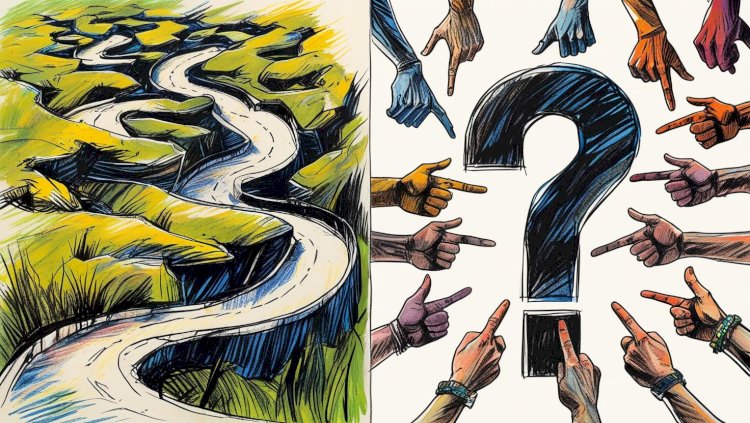Why Do We Look for a Culprit in the Face of Life’s Negativities?

Accepting everything life throws at us is not easy. Being successful, building a happy relationship, achieving our goals, or simply living with inner peace often feels like an intense struggle. During this process, seeking someone to blame for the difficulties, failures, or negative situations we encounter is a deeply rooted tendency in human nature.
So why do we instinctively look for someone to blame when faced with negativity? What psychological, social, and emotional reasons lie beneath this behavior? Why does blaming others or our environment feel so natural instead of ourselves? In this article, we will explore these questions through key concepts such as responsibility , awareness , and inner consciousness , which are central to personal development.
1. The Blame Tendency: Is It Natural?
The human brain is wired to understand and explain things. We naturally try to make sense of events by attributing them to causes. When it comes to negative experiences, asking “why did this happen?” is normal. However, this inquiry often shifts into “whose fault was it?” At this point, the brain may favor defense mechanisms over logic.
Blame is typically a defensive reaction . To emotionally feel safe, it’s easier to blame the external world. Admitting our own mistakes or shortcomings can be painful, so our first reflex is often to blame others or the environment.
For example:
- When you don’t get hired, you criticize the employer.
- Even if you played a role in the end of a relationship, you blame your partner’s character or behavior.
- In conflicts with family, you talk about their attitude but ignore your own.
While such blame may offer short-term relief, it ultimately hinders long-term personal growth.
2. The Role of Society: Cultural Foundations of Blame
Social structures also reinforce our tendency to blame. In many cultures, making a mistake is seen as shameful. Admitting faults is often viewed as a sign of weakness or inadequacy, leading many to avoid acknowledging their errors.
Education systems, family dynamics, and media contribute to a culture of blame. Children are often asked “Who did this?” rather than being guided toward understanding their role in a situation. This teaches them to focus on finding a culprit rather than solving the problem.
Moreover, growing up surrounded by media that constantly highlights who is responsible for problems conditions individuals to link negativity to other people’s actions.
3. Inner Emptiness: The Real Reason Behind Blame
The strongest reason behind the urge to blame lies in inner emptiness . If we haven't fully discovered our self-worth or developed a secure identity, the impact of negative experiences becomes more destructive. In such cases, finding an external scapegoat becomes a way to preserve internal balance.
We fear blaming ourselves because:
- We fear judging ourselves harshly,
- We believe we are unworthy,
- We cannot forgive ourselves,
- We think taking responsibility will isolate us.
Yet, true personal growth doesn’t come from blame—it comes from awareness. Honestly recognizing our roles, thoughts, behaviors, and emotions marks the beginning of personal transformation.
4. Blame as a Search for Control
Looking for a culprit in the face of negativity is also a search for control . If we believe something or someone caused the problem, we might think we can change or control it. But facing the reality that life is not entirely within our control can be frightening.
Therefore, some people prefer to attribute their hardships to external factors—people or systems. This helps them maintain a sense of security in how they perceive the world. For instance:
- “Everything would have gone well if my boss had supported me.”
- “I’m unhappy because my family doesn’t understand me.”
- “Everything would change if I met the right person.”
However, this mindset diminishes one’s sense of power. True freedom lies in taking responsibility for your choices, independent of surrounding circumstances.
5. Letting Go of Blame: The Path to Personal Growth
A crucial turning point in personal development is learning to stop blaming and start taking responsibility. This step isn’t easy, but it is the key to transformation. Taking responsibility doesn’t mean seeing everything as your fault—it means looking at situations objectively and examining your part.
a. Recognizing Your Part
In every negative situation, ask yourself: “What was my role here?” This question should not be used to shame yourself, but to increase awareness. In every relationship, decision, or event, there is always some level of your contribution.
b. Developing Emotional Intelligence
Emotional intelligence involves recognizing your own emotions, understanding others’ feelings, and managing emotions effectively. As your emotional intelligence grows, reactive blame gives way to empathy, understanding, and solution-focused responses.
c. Accepting That Mistakes Are Normal
Making mistakes is part of being human. Instead of blaming yourself for them, focus on learning from them. This mindset helps you treat yourself—and others—with more kindness.
6. The Impact of Blame on Relationships: What Do We Lose?
The habit of blame profoundly affects our relationships. No one wants to constantly feel accused. Long-term blame-based communication can create deep wounds in close relationships.
Additionally, blame weakens self-esteem. A person who always sees themselves as a victim cannot believe in their own strength or recognize their potential. Continuously searching for an external culprit dims the light of your own achievements.
7. Awareness: The Way Out of Blame
Awareness is the cornerstone of personal growth. Recognizing whether you automatically tend to blame yourself or others during difficult moments is the first step toward changing this pattern.
Ways to develop awareness include:
- Journaling : Write down your daily experiences, thoughts, and emotions. See in which situations you’re most prone to blame.
- Breathing exercises : Take time to breathe deeply during stressful moments. This reduces impulsive blame reactions.
- Asking reflective questions : Ask yourself, “What was my role in this situation?” or “What triggered the other person’s behavior?” to deepen your thinking.
- Meditation : Regular meditation creates distance between you and your thoughts/feelings, reducing the impulse to blame.
8. Taking Responsibility: A Powerful Choice
Taking responsibility is a powerful choice. It increases your ability to shape your own life. It doesn’t mean everything is your fault—it means asking, “How can I act more consciously in this situation?”
With this approach:
- You gain a stronger sense of control over your life.
- You build healthier relationships.
- You find inner peace.
- You experience less anxiety and anger.
Responsibility is not a burden—it is freedom. Once you realize you are the director of your own life, the need for blame gradually disappears.
9. Return to Your Inner World
Our greatest battles are not fought in the external world, but within ourselves. Our fears, insecurities, expectations, and past traumas shape the negativity we experience. Therefore, instead of looking for an external culprit, we must turn inward.
This shift begins with questions like:
- How well do I know myself?
- How has my past shaped me?
- What am I afraid of?
- What are my real needs?
- How kind and patient am I with myself?
When you begin addressing these internal questions, your tendency to blame naturally decreases. Because now, instead of focusing on the outside world, you're looking inward.
10. Choosing Communication and Empathy Over Blame
Healthy relationships are built not on blame, but on effective communication and empathy . Accepting that others may think, feel, and react differently allows for deeper understanding—even in moments of disagreement. Showing respect even when you don’t agree fosters compassion instead of blame.
Empathy suppresses blame. When you try to understand another person’s emotions, motivations, and background, you stop seeing them as a villain and start seeing them as a human being.
Conclusion: From Blame to Conscious Living
Looking for a culprit in the face of life’s challenges is a part of human nature. However, on the path of personal development, it is possible to become aware of this tendency and gradually transform it. Letting go of blame allows us to better understand ourselves and others. Taking responsibility marks the beginning of inner empowerment.
Always remember:
“One who blames himself closes the door to growth. One who understands himself finds the path to transformation.”
You can take a small step today by questioning your tendency to blame. This single step could be the beginning of a more conscious, empowered, and happier life. Because personal growth is not about blaming—it’s about understanding.
En güncel gelişmelerden hemen haberdar olmak için Telegram kanalımıza katılın!





















